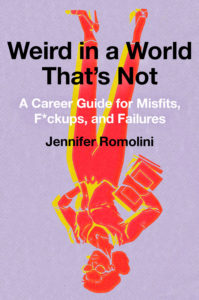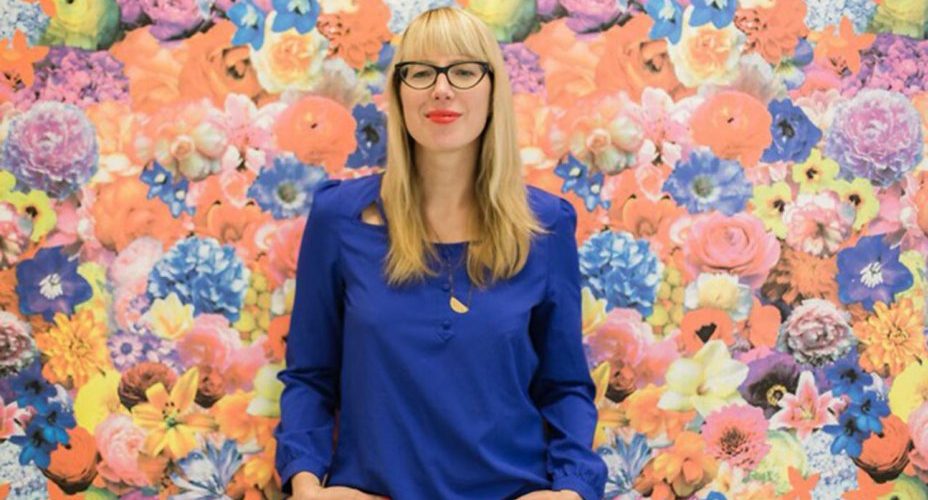I have read a lot of How-To-Get-Ahead books, and so I can say with confidence that Jennifer Romolini’s book, WEIRD IN A WORLD THAT’S NOT: A Career Guide for Misfits, F *ckups, and Failures is the most honest of all, like looking in a mirror and being told, here, here’s what to do, get a hold of yourself for fuck’s sake. Because: Jenn’s guide? It’s not filled with flowers and chirping chickens. No. It gets into how ugly it gets, how scared you get when you’re trying to establish yourself as a working, credible person in this world. How Jenn and I were not best friends while she was working and living in New York is a shanda; now she lives in Los Angeles and is chief content officer of Shondaland. In fact, I helicoptered around Hello Giggles—where Jenn worked before Shondaland—and I finally met her in person on her last day there! I was thrilled to speak to her about her book, her daughter, and the thing we refer to as making it.
I’m so grateful there is an honest how-to get-and-keep-a-job book out here. I feel like I could have really used this in the 90’s, when all I did was burn bridges. Why did you decide to write this book, now?
It was two things: I’d reached that point in my career where quote I was successful. I didn’t really see a lot of women dolling out advice. I felt like, oh well if there’s no guide that shows people it’s okay to be like this, that you could be a smart businesswoman and also be a mess. I wanted to write that for people. The second thing was at that point I was working with a lot of younger women and I felt like they were being portrayed in a bad light that was not actually accurate. I felt like these women were really looking for answers they weren’t getting and these answers needed to be intimate and direct and to tell them how to work. The work culture has changed so much. When you and I were coming up, people taught us things. We were assistants for a long time. We were apprenticed in a different way. It was not so fast. It wasn’t like boom you get a job. What I was seeing in my employees was they didn’t know how to write an email, they didn’t know how to talk about their ideas with confidence. It wasn’t that they were entitled; it was that they just didn’t have the knowledge. I felt like if I wrote a really specific guide for women who felt insecure at work it could be really useful.
There is a lot of yourself in this book. It’s not just a bunch of platitudes and clichés.
Thank you so much for saying that. I felt like why do this if I wasn’t going to be honest. I felt like if I wrote a book for other people that had a more noble purpose, the process would be easier for me to stomach and that was what I was really going for: this needs to be useful. I need to be as honest as I possibly can about my own mistakes and my own shortcomings so this can actually mean something to somebody who feels like they have shortcomings and they are making mistakes. I don’t need you to think I’m cool while I’m telling you about a resume. I can tell you how shitty my first resume was, how many stupid mistakes I made.

It’s nice to see an adult admit that they struggled too. I think you feel so alone, even now, when you’re trying to find a job. You’re filled with some much doubt, your self-esteem plummets, you’re almost paralyzed with fear and yet, you have one goal, to find a job.
I really wanted to be empathetic to that position–how vulnerable you felt, how scared you felt–because I remember feeling those ways. I remembered all the ways I tried to hide from how bad those feelings were by getting drunk and being in bad relationships. My life was disorder, which I think is just part of being in your twenties. I wanted to just be able to say, I felt like trash but I kept going anyway because I think that’s the message. Not oh its going to feel great lets throw our hats up in the air! It’s like no, sometimes its going to feel like shit and you have to keep going anyway. I really wanted to give whatever wisdom I had because I could have been so much more gentle with myself . That kind of vacillation between I am garbage and I am god. I really went through that at the beginning of my career. I would be like, oh that interview went really well, but then ten other things went wrong. It was like, nope, garbage garbage garbage. The idea that you have value as precisely what you are in this moment–maybe it’s not this for this job–but you have value somewhere? That would have really helped me.
How did your approach to work change when you became a parent?
I could put things in a better perspective once I had a kid because my identity was not just about work. I literally had something else to keep alive. I think you never find work/life balance. That’s bullshit. You never have it all, also bullshit. I do think that I learned that work wasn’t an end all be all. I had something more important to take care of at home and I think that changed my perspective on work a little bit. Motherhood made me a better manager, it made me not freak out as much about things that aren’t important. If you have a kid at home with 103 fever and you’re going to work and somebody’s like. oh the color isn’t right and everyone is freaking out, you can be like ok everybody the color isn’t right, nobody is dying, it’s a website. So I think motherhood helped me in that way.
I found I learned what a priority was when I became a parent.
That’s a much more concise way of putting it. I was talking to a friend the other day and she said to me, you know I had much more free time when I was a failure. And that’s the truth, that’s the trade off. If you’re going to be successful, you give all your time away. I’m in a particular moment and it’s thrilling and I’m really grateful for it so like it’s hard to parse out how I feel about the juggle and the balance because there really is no balance. I prioritize my kid above all else. I think I say in the book that I don’t juggle I cry.
And that is what makes you and your book so great. You’re not presenting a road map to being perfect. You’re laying out what it’s really like to get through the hardships when you feel like total garbage yourself.
It’s a fantasy, perfection is a total fantasy. If I white knuckle my way through everything, if I’m so stressed and I’m like, no it has to be perfect, it has to be perfect, I’m missing out on everything.
How has your approach to feminism evolved over the years?
I don’t know that I’ve changed so much. I’m fundamentally not very interested in men anymore. Professionally I don’t care. Like there are spaces for you, I just am not interested in being part of them. I always found men to be limited and always had to figure out how to work around them. Whereas with a woman, there’s so much going on. There’s such a deeper center of power.
***
Purchase WEIRD IN A WORLD THAT’S NOT: A Career Guide for Misfits, F *ckups, and Failures now!







0 Comments